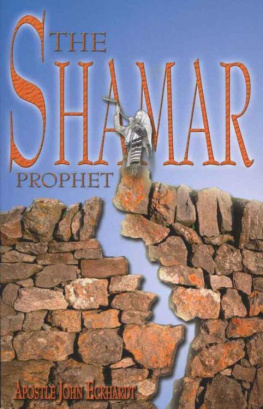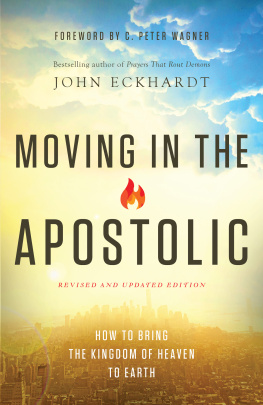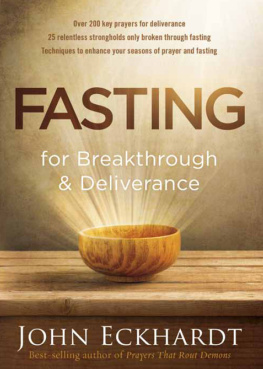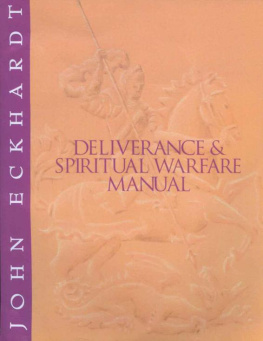John Eckhardt - The Shamar Prophet
Here you can read online John Eckhardt - The Shamar Prophet full text of the book (entire story) in english for free. Download pdf and epub, get meaning, cover and reviews about this ebook. genre: Religion. Description of the work, (preface) as well as reviews are available. Best literature library LitArk.com created for fans of good reading and offers a wide selection of genres:
Romance novel
Science fiction
Adventure
Detective
Science
History
Home and family
Prose
Art
Politics
Computer
Non-fiction
Religion
Business
Children
Humor
Choose a favorite category and find really read worthwhile books. Enjoy immersion in the world of imagination, feel the emotions of the characters or learn something new for yourself, make an fascinating discovery.
- Book:The Shamar Prophet
- Author:
- Genre:
- Rating:3 / 5
- Favourites:Add to favourites
- Your mark:
- 60
- 1
- 2
- 3
- 4
- 5
The Shamar Prophet: summary, description and annotation
We offer to read an annotation, description, summary or preface (depends on what the author of the book "The Shamar Prophet" wrote himself). If you haven't found the necessary information about the book — write in the comments, we will try to find it.
The Shamar Prophet — read online for free the complete book (whole text) full work
Below is the text of the book, divided by pages. System saving the place of the last page read, allows you to conveniently read the book "The Shamar Prophet" online for free, without having to search again every time where you left off. Put a bookmark, and you can go to the page where you finished reading at any time.
Font size:
Interval:
Bookmark:
Contents
Introduction
As an apostle, I have a desire to see strong local churches established in every region, territory and nation. Apostles are wise master-builders. The church is built upon the foundation of apostles and prophets (Eph. 2:20). Local churches need to be built and established with apostolic and prophetic grace.
The church cannot be built properly with only a pastoral anointing. Prophets need to be identified and established in local churches. God has set prophets in the church (1 Cor. 12:28). I have seen many pastors suffer terrible setbacks and attacks that cripple their ministries. Most leaders have never been instructed in the area of the prophetic. Many leaders are afraid of the prophet's ministry because of abuse or misrepresentation. Some leaders don't believe prophets are for today's church.
A church cannot function properly and fully without the prophet's ministry. This is because the prophet's ministry is designed by God to help protect the church from the devices and plans of hell. End-time churches will be built with all five ministry gifts in operation. We are destined to see the greatest churches built in the last days. The Holy Spirit is releasing a great amount of revelation concerning the local church. We are responding to this revelation by building churches with apostolic and prophetic grace.
Have you seen churches and its leadership suffer setbacks, problems, splits, and attacks that have sidetracked and destroyed the vision? This book will give answers to why this is often the case. The lack of prophetic ministry is a serious deficiency in many local churches. Churches that neglect and overlook this vital ministry will usually suffer the consequences. This book will give revelation concerning how to avoid and overcome the traps of the enemy.
The Role And Function
Of Prophets In The
Local Church
And by a prophet the LORD brought Israel out of Egypt, and by a prophet was he preserved. (Hosea 12:13)
Hosea 12:13 reveals to us one of the major functions of the prophet's ministry, preservation. Israel was delivered from Egypt through the ministry of Moses. Israel was preserved through the intercession of Moses (Num. 14:11-20). Preserve means to keep from harm, damage, danger, or evil. It also means to protect or save. The word preserved is from the Hebrew word Shamar . Shamar means to hedge about (as with thorns), to guard, to protect, to watch, to beware. This word emphasizes the protective element of the prophet's mantle. The word shamar is first used in scripture in Gen. 2:15. Adam is told to keep ( shamar ) the garden. It is also mentioned in Gen. 4:9. Cain asks God is he his brother's keeper ( shamar ).
The preserving and guarding aspect of the prophet's ministry is needed in every local church. This is accomplished through intercession, discernment, praise, preaching, teaching and worship. This helps defend the church against error, heresy, witchcraft, carnality, perversion, legalism, sin, and deception. Each church should develop and train the prophets that have been set in the assembly by God. A failure to do so can result in a local church
suffering from many attacks that could have been averted. A revelation of the prophet's ministry is vital to the success and health of the church. A revelation of the shamar aspect of the prophet's ministry will help churches protect and defend the flock.
Shamar means to guard, to keep, to be a watchman. It can refer to guarding a flock, the heart, the mind, a nation, or a city from outside attack or ungodly influences. It is used in reference to keeping (guarding) the gates or entries to cities. Each local church needs a prophetic guard. This is not one prophet, but a company of prophets who help guard the church from the invasion of the enemy. Churches that develop the prophetic ministry will have the advantage of being protected through prophetic intercession and the shamar aspect of the prophet s ministry.
To guard means to protect, watch over, stand guard over, police, secure, defend, shield, shelter, screen, cover, cloak, preserve, save, conserve, supervise, keep under surveillance, control, keep under guard, govern, restrain, suppress, keep watch, be alert, take care. Synonyms for guard include protector, defender, guardian, custodian, watchman, sentinel, sentry, patrol, and garrison. These words help define the shamar aspect of the prophet's ministry.
The church has often been taught that pastors are the spiritual guardians of the church, while neglecting the ministry of prophets. The church was never intended to function with only pastors. Prophets have also been set in the church (1 Cor. 12:28). Churches that ignore the prophet's ministry will not be able to withstand the attacks of hell in the last days. Many well-meaning pastors have suffered unnecessarily due to the lack of understanding of the prophet's ministry. When the LORD establishes a church, he will set prophets within that church. Churches must be built with apostolic wisdom that will include the recognition and release of prophets. The shamar aspect of the prophet s ministry is one of the most important that will benefit the church.
According to Paula Price, shamar is a Hebrew word for prophet as watchman. The shamar aspects of the prophet pertains to the officer's role as a gardener tending to the flock over which he or she has care. It also applies to the guardianship, sentinel, and protective function of the office. To shamara people or work prophetically is to encircle it, build a divine wall or hedge of protection, or to seal the hedge in which the devil has broken with satanic assaults, attacks, and warfare. See Psa. 127:1 and 130:6; and 62:6; Song of Solomon 3:3 and 5:7...Watchmen duties then are accomplished through the prayers, intercessions, and petitions of the prophet on behalf of the church...Such a guard would consist of the prayer team, the special intercessors, dedicated psalmists, seers, and of course subordinate prophets...Thus the word shamar emphatically gives prophets the status of spiritual guards, warriors, supernatural enforcers, and keepers of the churches of God. See Jer. 17:16 and 50:6-7 as examples...Additionally, our word shamar identifies a prophet who encircles (or surrounds) to retain and attend to, as one does a garden. The prophet's spiritual authority acts as a fence or garrison around an assigned congregation to shield it from harm, attack, or demonic trespass. Protection from trespassers, as meant here, includes protection from the spoilage, destruction, invasion, and threats that result from spiritual and human trespassers in the church. There are times heretical types or wayward renegades join a church to sow seeds of destruction in it. The watchful eye of the resident prophet can spot these people and bring spiritual discomfort on them so they are ill at ease among the flock and quickly leave.
Behold, he that keepeth ( shamar ) Israel shall neither slumber nor sleep. The LORD is thy keeper ( shamar ): the LORD is thy shade upon thy right hand. The sun shall not smite thee by day, nor the moon by night. The LORD shall preserve ( shamar ) thee from all evil: he shall preserve ( shamar ) thy soul. The LORD shall preserve ( shamar ) thy going out and thy coming in from this time forth, and even for evermore. (Psa. 121:4-8).
We can see from these verses that God shamars his people. God loves his people and protects them. The shamar aspect of the prophet's ministry is a part of the nature of God. God never slumbers or sleeps (always alert). God shamars us from evil. God shamars our souls (mind, will, and emotions). God shamars our going out and coming in (travels). It is the nature of God to protect. Protection is a part of our covenant. Prophets are a part of our covenant.
Some leaders look at prophets as trans-local ministries only, while the pastor is stationary. It is a blessing to bring prophets in from the outside to minister. This does not replace prophets that need to be stationed in the house. These shamar prophets are a part of the local church, just as pastors.
Font size:
Interval:
Bookmark:
Similar books «The Shamar Prophet»
Look at similar books to The Shamar Prophet. We have selected literature similar in name and meaning in the hope of providing readers with more options to find new, interesting, not yet read works.
Discussion, reviews of the book The Shamar Prophet and just readers' own opinions. Leave your comments, write what you think about the work, its meaning or the main characters. Specify what exactly you liked and what you didn't like, and why you think so.

















